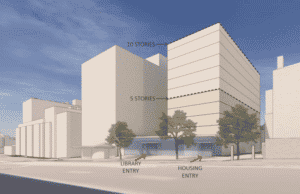A pair of Boston Public Library properties in West End and Egleston Square are being studied for up to 142 affordable housing units as the city seeks to maximize some of its underutilized real estate.
The Cambridge Street branch in West End could have a new neighbor with construction of a 10-story building including 85 housing units, according to an analysis performed by Ann Beha Architects. Several designs are in the mix for a potential expansion and redevelopment of the single-story Egleston Square branch on Columbus Avenue, including a 5-story addition with up to 57 housing units.
The West End library expansion would add a new civic space in an area that has seen explosive growth in recent years with nearly 5 million square feet of development at The Hub on Causeway and Bulfinch Crossing mixed-use projects.
Philip Chen, principal with Ann Beha Architects, outlined plans for an expanded library including a 100-capacity meeting room.
“The West End neighborhood doesn’t have a school, a senior center or a youth center,” Chen said at a recent community presentation. “There should be multifunctional, flexible spaces that provide programming for seniors and youths and all ages.”
The architects are studying two options for expansion of the Cambridge Street branch – both a 1- and 2-story version – which would sit in front of a 5- or 10-story housing section containing 35 or 85 units. The existing 7,145-square-foot branch sits on a 20,385-square-foot parcel.
In Egleston Square, architects are studying a library expansion along with an affordable housing addition ranging up to 5 stories. The existing library branch occupies a quarter of the 24,916-square-foot lot.
The projects require approval in the city’s capital plan, along with zoning variance for the 10-story version of the West End project. Specifics on income requirements and type of housing units would be determined before issuance of a request for proposals, according to presentation materials.
The city’s Housing Innovation Lab has been studying ways to generate housing at city-owned properties with excess development capacity, including libraries, fire stations and community centers.
“We see this as an opportunity to promote creativity in the use and redevelopment of our public buildings,” Housing Innovation Lab Director Taylor Cain said.









